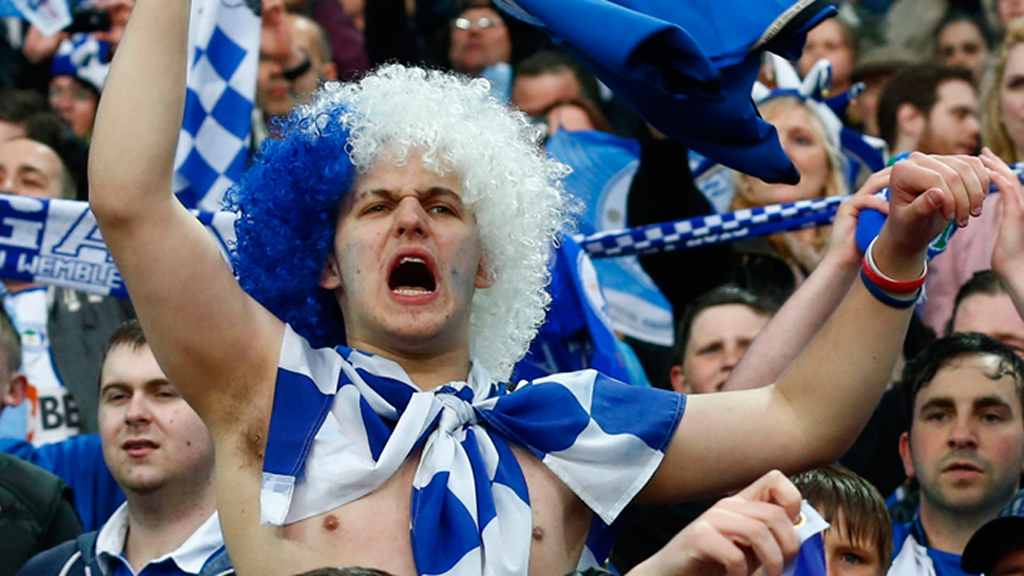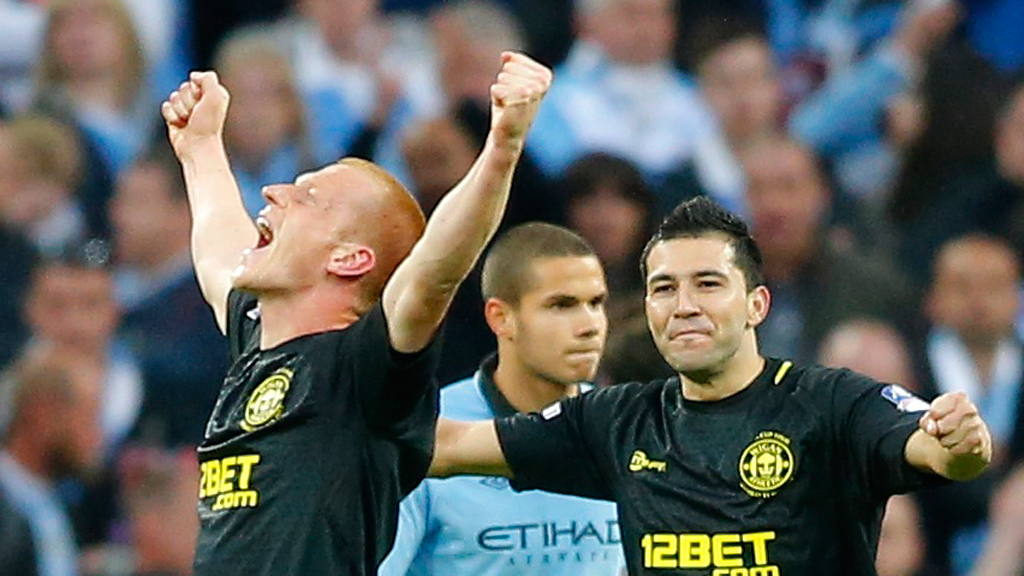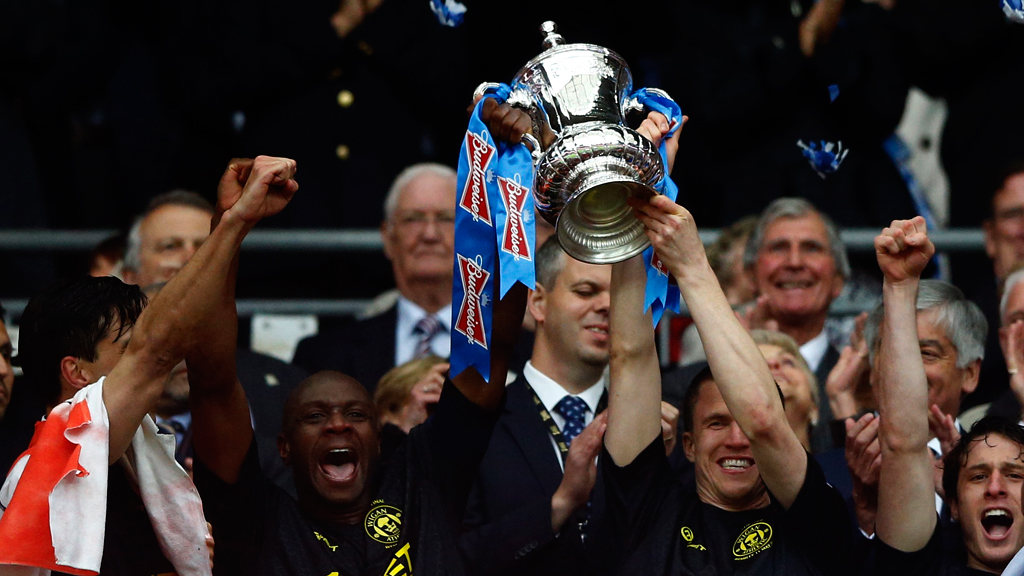Wigan’s fairytale win returns soul to FA Cup
After years of commercialisation, Wigan Athletic’s dramatic FA Cup final win helped restore a little lost lustre to the most famous knock-out competition, writes football commentator John Anderson.

Just before 7pm on Saturday evening, a stoppage-time flick of Ben Watson’s head secured Wigan Athletic’s first ever major trophy and completed the biggest FA Cup final shock in a quarter of a century, writes football commentator and writer John Anderson.
Since 1872 when the Old Etonians beat the Royal Engineers in front of 2,000 people at Kennington Oval, the FA Cup came to represent the ultimate sporting encapsulation of drama, upsets and above all romance; its annual showpiece was the very essence of triumph, despair and pageantry. On these generally sun-bathed afternoons Wembley Stadium became, to borrow from TS Eliot, “the still point of the turning world”.
Yet in the run up to the 132nd edition of this global jamboree, there was little to suggest that future generations may be as mesmerised by its lustre as their antecedents. True, the meeting of Manchester City and Wigan had to compete for column inches and air time with the retirement of five times FA Cup winner Sir Alex Ferguson and the appointment of David Moyes as his replacement at Manchester United.
‘Footnote’ of a final
But there was a real sense that the FA Cup final had become an almost irritating footnote to the real business of Champions League qualification and Premier League survival. On the eve of the game the Daily Telegraph, as traditional a newspaper as you will find anywhere in the world, carried no mention of it until page 6 of its sports section. And on the day itself, it presented the match as the backdrop to the ongoing saga of whether Roberto Mancini would lose his job as City boss.
It is a long while since the word ‘fairytale’ was used to describe an FA Cup final but this is the very essence and spirit of the competition.
However much we may be imbued in “the romance of the cup” it is hard to argue with such editorial judgements.
There is no question that the FA Cup final’s place in the hearts and diaries of football fans has been severely diluted in recent years. The once fitting climax to the domestic season had to share top billing this year with a massively important Premier League clash between Aston Villa and Chelsea; the year before it had been one of no fewer than 26 games being played in England that day.
And to illustrate the point, see how long it takes you to recall the teams, score and scorers in the 2012 final.

‘American froth’
Much of this stems from the prevalence of live games on television and the concomitant riches on offer through mere participation in the upper tiers of English and European football. The FA Cup is not a route into the Champions League so you cannot really fault the reasoning of a mega rich club owner thinking; “why win a piece of silverware when fourth place in the Premier League offers us so much more cash.”
It is not a little ironic that as the FA Cup final struggles to compete for status and financial clout, the competition is sponsored over three years to the tune of £24m by US brewing giants Budweiser. This rather incongruous marriage, solemnised in 2011, had the Football Association’s General Secretary Alex Horne gushing at the time: “Like the FA Cup, Budweiser has a proud heritage and a long history of being involved in football.”
Let the legacy of Wigan’s wonderful win be an end to the ludicrous, extraneous commercialisation of this fabulous event.
Although everyone else who has ever watched a single FA Cup match was struggling to equate the American froth with white horses, twin towers and Stanley Matthews.
No sooner was the ink dry on the contract than the kick-off time was put back to 5.15pm – presumably for the benefit of those who wished to guzzle the ghastly fizz in local pubs rather than those who had actually been to the final and needed to get home afterwards.
Commercial gains
When the time finally arrived, the pre-match rituals on the Wembley pitch provided more evidence that the FA Cup is in the hands of 21st century marketeers rather than footballing purists. In an act that can only be described as one of pure sacrilege, the traditional hymn Abide With Me came not from the hearty throats of a legion of north west fans, but via a bizarrely dressed quartet who looked like the Belgian entry in the Eurovision Song Contest.
As their strangulation of the tune was belted out at unnecessarily high volume, the cameras panned embarrassingly across huge sections of the crowd who remained tight lipped and unresponsive; not out of disrespect but out of sheer disbelief.
When the feckless foursome had been put back in their boxes we settled down to watch a match which just about everyone believed would end in a routine Manchester City victory, so much so that some bookies had Wigan at 8-1 outsiders in this two-horse race. ITV match commentator Clive Tyldesley’s final comment before kick-off was to try and convince us (and perhaps himself) that “the FA Cup still counts”. The following 90 minutes proved that it most certainly does

‘Fairytale’ win
Wigan’s deserved victory transported us back 25 years to the afternoon when Wimbledon’s “crazy gang” had the audacity to upstage mighty Liverpool. Even the manner of the winning goal, a near-post header flicked into the far corner from a set piece delivery, echoed that day perfectly.
For Dennis Wise and Lawrie Sanchez, read Shaun Maloney and Ben Watson. In terms of the FA Cup it was a life-affirming moment. Proof that no matter how much the format is mucked about with by “creatives” with not a shred of respect for the traditions of the game or its supporters, the 141-year-old pursuit of the old pot does still retain the ability to enthrall and astound. It is a long while since the word “fairytale” was used to describe an FA Cup final but this is the very essence and spirit of the competition. It is why all those years ago the FA instigated a challenge trophy to culminate in an annual final.
Wigan have reminded us that winning the FA Cup means as much, if not more than, mere survival.
Wigan still have two games left to try and secure their Premier League status against the odds. But they have reminded us that winning the FA Cup means as much, if not more than, mere survival. Forty years ago Sunderland defeated Leeds in the final at Wembley, an achievement which was commemorated before their last home game. It is unlikely that they will stage similar events to celebrate the anniversary of the years they stayed in the top flight.
So let the legacy of Wigan’s wonderful win be an end to the ludicrous, extraneous commercialisation of this fabulous event.
Let the FA Cup final stand alone as the season’s showpiece on the last Saturday afternoon of the season and let it kick off at 3pm. Its joy, pain, drama and global appeal springs from historic endeavour, indelible memories and human hearts and voices. Not backing singers and beer commercials.
-
Latest news
-
Ex-Trump lawyer Michael Cohen testifies at hush money trial3m

-
Racial hate speech laws being ‘weaponised’ warns National Black Police Association7m

-
‘Hard to believe so many women going through such horrors’, says woman whose baby daughter was stillborn8m

-
Damning report condemns ‘shockingly poor’ UK maternity services12m

-
People ‘expecting the West to stand by Georgia’, says opposition party leader5m

-




